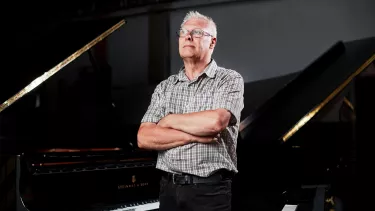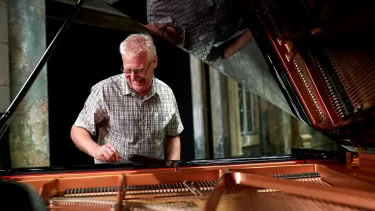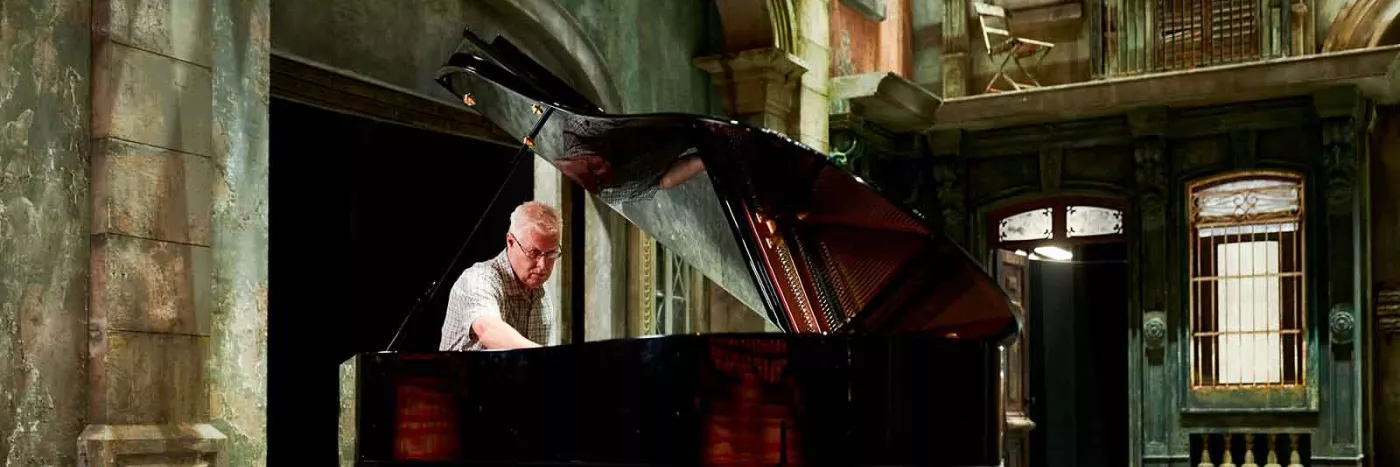Tuning the grandest of all instruments
Terry Harper is pitch perfect when preparing Sydney Opera House pianos for the greats
In the lead up to our Piano Day 2020 exclusive broadcast, we profiled some of the pioneers of the foundational instrument.
Watch Margaret Leng Tan in the full Piano Day stream.
Nils Frahm calls the piano “the king of all instruments”.
“There's obviously organs and synthesizers and all the other types of key instruments which I love as well – and I use them for my music – but I think the piano is kind of the king of all these instruments and I like to celebrate it.”
The German pianist, who dazzled Opera House audiences in the Concert Hall last year and at Vivid LIVE in 2014, wanted to share his passion with the world, so he came up with Piano Day, an annual event held on the 88th day of the year to represent the number of keys on a piano.
The idea is to encourage communities to hold events that celebrate the instrument, from gatherings at home to performances in concert halls. Since it began in 2016, this simple concept has resonated around the world, with events taking place from Moscow to Montreal; from Berlin to Brighton.
This year, more than 100 events were scheduled to take place. Since the pandemic broke out, a message on the Piano Day 2020 website advises people to cancel or livestream events and “stay safe, act responsibly, and enjoy the music”.
The Sydney Opera House will celebrate the day with a broadcasting event of interviews and performances recorded on location and, in the age of COVID, in artists’ homes. Hear the day’s founder, Nils, talk about the piano and what it means to him, alongside performances and interviews with pianists such as Britain’s Jon Hopkins, the Netherlands’ Joep Beving, Sydney-born New Yorker’ Andrea Lam, and New York’s Margaret Leng Tan, an experimental musician and toy piano virtuoso who will explain how to give a prepared piano performance.
Each year, the Opera House programs a diverse range of musical genres , and the piano plays an important role in almost all of them, including classical, opera, jazz, Latin, R&B, pop, rock and more. The venue has about 30 pianos onsite, in its venues, foyers and dressing and rehearsal rooms. Some lie dormant, sitting in a storage room below sea level, waiting to be wheeled into a lift and onto a stage, where dexterous fingers will awaken them from their slumber.
Before any piano is ready to be played, it must be tuned. Many factors can make a piano go out of tune – age, temperature, humidity, how the pianist plays – and with more than 200 strings, it’s a complicated job that calls for a specialist such as Terry Harper, who has been tuning the pianos of the Opera House for more than 30 years.
“It's actually a very difficult thing to master,” says Terry. “It's not something you can pick up in five minutes. Even after a one-year course, you're pretty basic at tuning pianos. It takes 10 years to learn how to set a piano in tune.”

Terry has honed his craft over decades, beginning with a piano tuning course at Sydney’s Cconservatorium of Music in 1975 and a stint at Steinway’s in London, that included work at Royal Albert Hall, the BBC and the Beatles’ Abbey Road Sstudios.
Terry’s father, Ron, had tuned pianos at Sydney’s nightspots and began working at the Opera House shortly after it opened. When Terry was a boy, his father would take him to many of his glamorous gigs, at a time when there were many glamorous gigs in town. Terry reels off a list of venues, now gone and mostly forgotten – the Trocadero, Chequers, the Chevron – that hosted big names and drew big crowds.
“I remember after choir practice on a Thursday night he would take me to the Chevron Silver Spade Room or Chequers to see people like Shirley Bassey and Robert Goulet and Cilla Black,” he says with a hint of wonder, as if he still can’t believe he had such a childhood.

Terry says this work at Sydney’s prestigious venues – the Trocadero had two pianos on a revolving stage and a capacity of 1,000 people – meant his father was highly regarded by local musicians and believes it’s the reason Ron was hired at the Opera House all those years ago. And it’s the reason Terry, who took over from his father, now has what he calls “the best job for a piano tuner in the world”.
Terry doesn’t play piano (he gave up lessons after a year and later learned drums), but he loves to listen to it and it’s also clear he takes great pride in his work.
“I mean you sit listening to a piano that you've just tuned and someone is playing a beautiful piece of music on it and all these people are loving it … it gives you a great deal of satisfaction.” he says.

